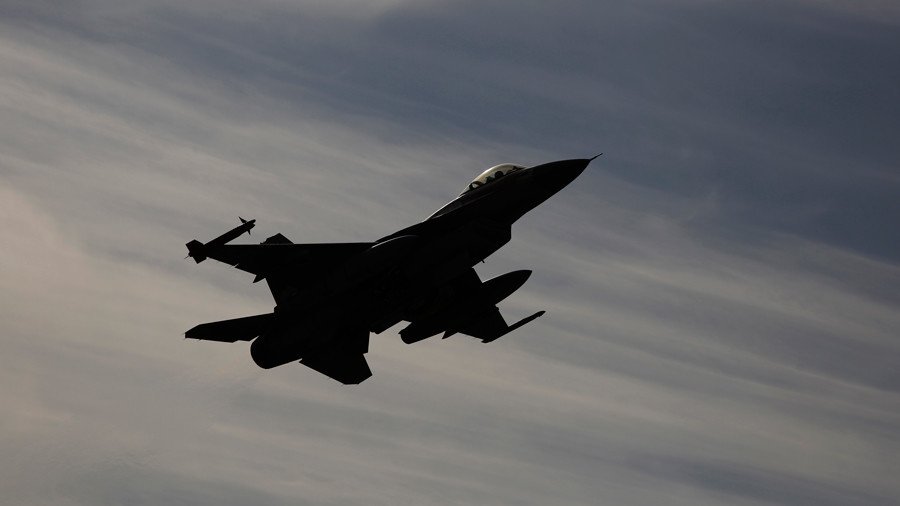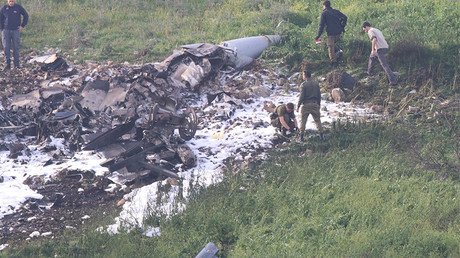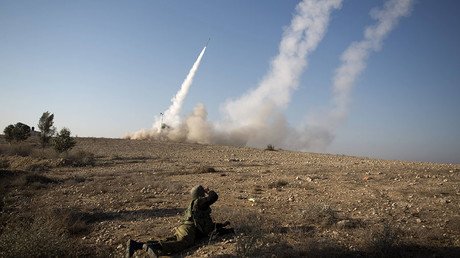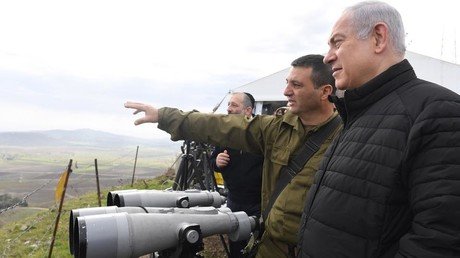Syria strikes back as Israel discovers its warplanes aren’t invincible

Israel has long been the unchallenged bully in the Middle East, but now Tel Aviv will face consequences for its temper tantrums. That was the message from Damascus last weekend when the Syrian army shot down an Israeli F-16.
The dramatic escalation happened as Israel claimed one of its warplanes was in Syrian airspace to intercept an Iranian drone that had been operating in Israeli territory. But, in reality, the Iranian drone was intercepted in the Golan Heights, which is Syrian land that has been illegally occupied by Israel since 1967.
Of course, this didn’t stop major western publications like the Wall Street Journal from referring to the Golan as “Israeli airspace.” Nevertheless, the mainstream media was left in disbelief by the incident—the New York Times, for example, was startled to discover that “Israeli jets aren’t invincible.”
As usual, Israel painted itself as a victim of irrational Arab aggression. However, in fact, Syria was clearly acting in self-defence against repeated Israeli violations of its sovereignty.
Even the head of the Israeli Air Force Air Division confessed that his country has carried out "thousands of operations in Syria" in the last year alone. This fact was missing from most mainstream news accounts, which portrayed Israel as a non-interventionist bystander in the Syrian conflict. That couldn’t be further from the truth. Not only has Israel repeatedly bombed Syrian government installations, it has also armed Jihadist rebel groups in the Golan Heights, coordinated with Al-Qaeda’s Syria affiliate against government forces and provided medical treatment to Al-Qaeda and Islamic State-linked rebels before sending them back into battle.
Muddying Waters
Support for Al-Qaeda in Syria serves two strategic purposes for Tel Aviv. One reason is to weaken Hezbollah, the armed Lebanese political party that defends Lebanon’s borders from Israel and Salafi Jihadist groups alike. The second purpose is to solidify its takeover of the Golan.
Don’t take my word for it, Israeli officials have said as much. The former head of Mossad (Israel’s intelligence agency) admitted to Al Jazeera that Israel provides medical treatment to Al-Qaeda fighters in Syria. And, since 2012, the UN Disengagement Observer Force (UNDOF), the peacekeeping mission responsible for monitoring the 1974 ceasefire line between Israeli and Syrian forces in the Golan Heights, has documented dozens of interactions between the Israeli army and Syrian insurgents. On top of that, there are Syrians who defected from the Free Syrian Army after discovering the relationship between Israel and the rebel groups in the Golan.
For people living in the region, the downing of Israel’s F-16 felt like long-overdue retaliation, while Tel Aviv tried desperately to paint the escalation as a fight with Iran. But it was Damascus, not Tehran which downed the fighter jet in a deliberate calculation, which was not made lightly. This was, after all, the first time since 1982 that Syria has shot down an Israeli plane.
The leadership in Damascus has warned time and again that it would eventually respond to Israeli aggression, and it finally did, sending a message that Israel cannot continue to violate Syria’s sovereignty without a response.
Israel responded by striking what it called Iranian bases and claiming to have wiped out most of Syria’s air defenses. But, according to the Syrian government, Israel struck bases from which Syria and its allies target Al-Qaeda in Idlib, essentially making Israel into Al-Qaeda’s air force.
After years of western attempts to overthrow the Syrian regime, one thing is clear: the Syrian state has remained intact and is winning the war, having retaken almost all of the territory it lost to rebel groups that were armed and funded by western and gulf states. The Syrian state has been able to take back territory due in large part to assistance provided by its allies, particularly Russia.
The next war
There will eventually be a showdown between Israel and Hezbollah. But the rules of the game have changed dramatically in Hezbollah’s favor since the two last fought. In the 2006 war, Hezbollah gave Israel a bloody nose but Lebanon was devastated in the process. In any future war, Hezbollah will be able to do far more damage to Israel. The organization is much stronger, far better armed and is able to carry out offensive maneuvers after gaining extensive battlefield experience against jihadists in Syria. Also, any future war with Israel will likely include the involvement of Hezbollah’s allies in Syria and Iraq, transforming what would otherwise be a local conflict into a regional one.
Israel is afraid to test these waters, so, for the time being, the Israelis are not interested in a hot war with the group. After all, it was the Syrian army that downed the plane using Russian anti-aircraft S-200s. Russia’s involvement in Syria complicates Israel’s ambitions as Israel cannot go to war with Russia. Moreover, Israel does not have the same backing as usual from its American benefactors. While there are almost no limits on the amount of aggression Israel can inflict on Palestinians, Syria is a far more complicated battlefield involving major world powers.
Both the US and Russia have personnel on the ground in Syria--the US is supporting the Syrian “Democratic” Forces, while Russia is backing the government. Turkey, a member of NATO, has troops occupying areas of northern Syria and is fighting the Kurds in Afrin. Meanwhile, Iran has advisers on the ground assisting Syrian government forces against Al-Qaeda and Islamic State. This month, a Turkish helicopter was shot down by the US-backed Kurdish forces in northern Syria, a Russian plane was downed by Jihadists in Idlib, an Iranian drone was blown up by Israel, an Israeli F-16 was destroyed by Syria, and the US has claimed it killed up to 100 pro-government forces in airstrikes near Deir Ezzor.
Thus, if Israel escalates the situation in Syria, too much can go wrong. And judging from the State Department’s weak words of support for Israel in the aftermath of the F-16 crash, the US does not seem interested in backing an Israeli war at this time because it risks a hot war with Russia and undermines the ongoing fight against ISIS, which is an American priority.
However, Israel fears Hezbollah’s growing strength and Iran’s growing influence as a threat to its regional hegemony—a concern shared by its Saudi and American counterparts—and will continue its provocations in Syria in an effort to counter what it sees as a growing Iranian presence next door. There are also domestic Israeli considerations that may influence their actions. Israeli Prime Minister Benjamin Netanyahu is currently facing a corruption probe and potential indictment, which has saturated the Israeli press and has led to protests against him. Of course, war can serve as an excellent distraction under such circumstances.
At the same time, Damascus has warned it will no longer take acts of Israeli aggression lying down, demonstrating that after seven years of attempted regime change in Syria by western powers, Iran, Syria and Hezbollah--known by their many supporters in the region as “the resistance axis” for their role in challenging western imperialism—are in a position of strength. And they are on a collision course with Israel.
The statements, views and opinions expressed in this column are solely those of the author and do not necessarily represent those of RT.

















